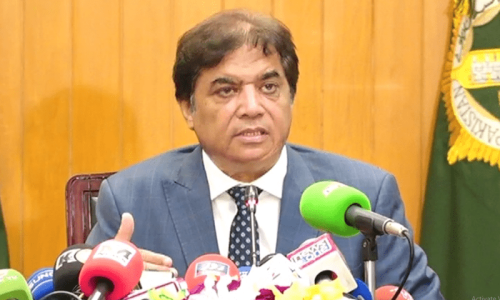DAVID Crystal in his monumental work ‘The Cambridge encyclopaedia of the English language’ has mentioned that the English language has borrowed a huge number of words from other languages. He says: “Whereas the speakers of some languages take pains to exclude foreign words from their lexicons, English seems always to have welcomed them. Over 120 languages are on record as source of its present day vocabulary, and the locations of contact are found all over the world” (page 126). The point to note is that nobody derides English by calling it ‘lashkari zaban’ (camp-language) or ‘khichri zaban’ (hotchpotch language), unlike what we do with Urdu.
Though Urdu does not seem to be so receptive as English, it has borrowed wholeheartedly from many languages, including Arabic, Sanskrit, Persian, Portuguese, English, Gujarati, Punjabi, Turkish, Sindhi, Pashto and Prakrit. Through Arabic, Urdu has borrowed words from Hebrew. Through English the Latin, French and Greek words found their way into the language. Of them, perhaps Pashto seems to be a bit strange but it is a fact that many Urdu words perceived as having their roots either in Persian or Sanskrit have been borrowed from Pashto. The scholar who knew this quite well and wrote in detail about the Pashto words in Urdu and Urdu’s roots in Afghanistan was Maulana Imtiaz Ali Khan Arshi Rampuri. Arshi sahib in his work ‘Urdu mein Pashto ka hissa’, or Pashto’s role in Urdu, (published by Pashto Academy, Peshawar) stressed that Pashto-speaking Afghans had been migrating to Indo-Pak subcontinent since 12th century AD and they kept on bringing with them a large number of Pashto words for centuries. Also, Urdu did not borrow many Arabic, Persian and Turkish words directly from these languages but through Pashto that migrating Pathan tribes spoke since those words had already assimilated into Pashto, albeit with a slightly different pronunciation.
Interestingly, a large number of migrating Afghan Pathans, especially Rohillas belonging to Yousufzai tribe, settled in North-Western part of Uttar Pradesh, India, and the region was named Rohilkhand. They settled in the region and began speaking Urdu but even after centuries many knew Pashto, their ancestral language. Imtiaz Ali Khan Arshi was born on Dec 8, 1905, in Rampur (Rohilkhand) into a Haji Khel family (a branch of Akezai clan which is in turn a sub-tribe of Yousufzai tribe). His ancestors had migrated to Rohilkhand in 18th century AD. In addition to Urdu and Hindi, Arshi knew Pashto, Arabic, Persian and English and was in a perfect position to tell the Pashto-origin words from other words in Urdu.
Imtiaz Ali Khan Arshi is a well-known research scholar of Urdu and is considered an authority on Ghalib. But this is only one side of the coin: Arshi was as well-known a scholar of Arabic and Persian, too. His research work on Arabic and Persian manuscripts had earned him high esteem in the scholarly circles specialising in Persian and Arabic, both in the sub-continent and elsewhere.
Another prominent trait that makes him stand out is his love for books and libraries. In his late twenties, after having quit a government job and winding up his unsuccessful business venture, he began spending much of his time at Rampur’s Raza Library, going through rare Persian, Arabic and Urdu manuscripts. Impressed by his love for books, Mr Chapman, an Englishman and the director of the library, asked him to assist him. He joined in 1932 and it was Arshi’s love for books and manuscripts and his sheer devotion that when Chapman quit in 1951, Arshi was made the director of the library, a post he held till he breathed his last in 1981. Arshi spent about half a century serving the library.
Rampur’s Raza Library had a huge collection of rare books and manuscripts. Arshi would spend most of his time reading and evaluating them, making sensational discoveries. For example, he discovered and edited the manuscript of a ‘tafseer’ (commentary on Quran) penned by Imam Sufyan Sauri, a scholar of the 8th century AD, hitherto believed to be lost forever.
Many scholars, including Syed Sulaiman Nadvi, believed that the authentic collections of Hadith were not introduced to India in the early period of Islam. But Arshi proved that two disciples of Hasan Basri — Abu Moosa Israel Bin Moosa Basri and Abu Hafs Rab’i Bin Sabih Basri — had reached India, which had resulted in the spread of Hadith in India in the 4th and 5th centuries Hijra. Arshi’s work on the authenticity of Hazrat Ali’s book ‘Nahj-ul-balagha’ is a remarkable piece of research. His research on great Persian poet Khayyam is also referred to with great regard.
One of the most prominent scholarly works of Arshi is his edited and annotated version of Divan of Ghalib. Known as ‘Nuskha-e-Arshi’, it is considered the most authentic version of ‘Divan-e-Ghalib’ and is also reckoned as one of the finest pieces of textual criticism in Urdu.
Arshi’s other books and edited works include ‘Maqalat-e-Arshi’, ‘Fehrist-e-makhtootat-e-Urdu’, ‘Catalogue of the Arabic manuscripts in Rampur Raza Library’, ‘Dastoorul fasahat’, ‘Salk-e-gauhar’, ‘Makateeb-e-Ghalib’, ‘Farhang-e-Ghalib’, ‘Bagh-e-do dar’, ‘Naadiraat-e-shahi’, ‘Tarrekh-e-Muhammadi’, to name but a few.
Many of his works still remain unpublished. His many articles on Ghalib too are buried in literary journals and need to be collected in book form. A few know that Arshi was a poet too because he would not go to any mushaera, nor would he send his poetry to any journal for publication. But his poetry mostly appeared in ‘Nairang’, a literary magazine published from Rampur, whose editor Azizullah Khan was Arshi’s friend. These poetic pieces too need to be collected. Many books and articles highlighting his life and eulogising his works have been published. Recently, Lahore’s Izhar Sons have published a book evaluating Arshi’s works on Ghalib. Written by Abdur Rahman Butt, it is titled ‘Ghalib shanas Maulana Imtiaz Ali Khan Arshi.
Imtiaz Ali Khan Arshi Rampuri died on Feb 25, 1981, in Rampur.
Published in Dawn, February 23rd, 2015
On a mobile phone? Get the Dawn Mobile App: Apple Store | Google Play
















































